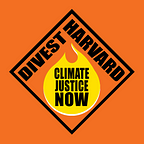At Climate Leadership Summit, Students Call Out Harvard’s Role in the Climate Crisis
An activist workshop pointed out how Harvard retains major ties to the fossil fuel industry
CAMBRIDGE — Last week, Fossil Fuel Divest Harvard members joined other activists at the Kennedy School to discuss organizing against climate injustice. Their workshop was part of the Harvard Climate Leadership Summit, a section of Harvard Climate Action Week, which had the stated goal of “celebration and acceleration of climate research, education, and engagement.” Yet despite such lofty aims, as FFDH members pointed out, Harvard is still deeply entangled with the fossil fuel industry — especially in its research.
“We know who is responsible for climate change,” said Sophia ’24, citing the statistic that nearly three-quarters of global emissions originate from just 100 companies. “We know what the impacts are and how they are unjust. So why is Harvard still supporting the culprits?”
According to a study released earlier this year, Harvard received over $20 million from major fossil fuel companies between 2010 and 2020: an absolute lower bound, since the study worked only with publicly available information. In particular, several prominent climate initiatives at the Harvard Kennedy School — the very school where the Harvard Climate Leadership Summit was being held — are bankrolled by oil companies and directed by fossil fuel insiders. This is despite the fact that industry funding has a proven toxic impact on climate research, skewing findings in favor of fossil fuels, and despite Harvard’s purported plans to make its major contributions to sustainability through research.
In fact, climate conflicts of interest plagued many of the Harvard programs represented during Harvard Climate Action Week. The Harvard School of Public Health, which had an event on Monday called “Climate, Health, and Equity,” has taken hundreds of thousands in research funding from ExxonMobil; Harvard Law School, which held an “Environmental and Climate Justice Reception” on the same day, is the home of Jody Freeman, a board member of ConocoPhillips with a salary of $350,000 a year. In a similar vein, the Harvard Business School, which held an “Accelerating Climate Solutions” event on Wednesday, hosted an ExxonMobil career recruitment event last November.
Ilana Cohen ’23 called on the Salata Institute, which organized the week of events, to adopt a policy of rejecting all research funding and conflicts of interest from the fossil fuel industry.
“Harvard cannot champion knowledge of climate solutions while partnering with and accepting research funding from the very fossil fuel companies fighting against those solutions every day,” she said. “The Salata Institute is mired in hypocrisy and complicity in climate injustice until it adopts Fossil Free Research.”
Though the Salata Institute’s website contains a nebulous claim not to accept funding from “any company that does not share the goal of moving our global economy away from fossil fuels” — and though this commitment came after student organizing around Fossil Free Research — no specific companies are named, nor is there any specific criteria for measuring whether a company “shares” this goal. Given Harvard’s general acceptance of fossil fuel money, there is no guarantee Salata will do better.
Throughout the workshop, Fossil Fuel Divest Harvard members pointed out other ways Harvard falls short on climate justice. They drew attention to Harvard Corporation members like David Rubenstein who finance fossil fuel projects, to the Corporation’s history of buying up international land and subjecting it to environmental degradation, and to Harvard’s exploitative practices in Cambridge, where it owns an enormous amount of land and drives up rent prices but pays no property taxes to the city.
“Harvard lacks any real accountability to its community,” said Phoebe Barr ’24. “It’s not democratically governed — in fact, the $53 billion endowment is controlled by only thirteen people. When talking about climate justice, it’s necessary to talk about the unhoused population of Cambridge, or the poor communities where fossil fuel companies set up shop and pollute the air and water, or citizens of the global south forced off their land when Harvard buys it up. That’s why we have our vision for reinvestment: Harvard should take its substantial resources and put a real, significant amount of them toward repairing the climate harms it’s done and collaborating with frontline communities.”
Activists laid out the new Fossil Fuel Divest Harvard manifesto, which is printed in full on the organization’s website. After Harvard’s commitment to divestment, FFDH’s new demands include a policy of fossil free research, an end to fossil fuel industry recruitment events on campus, a just reinvestment, and a commitment to building a more democratic governing structure at Harvard.
“These seem like ambitious goals,” said Barr, “but Harvard can make small steps toward them today. And if the university is committed to actual acceleration of climate action and research, like the Salata Institute says on its website, those steps are absolutely necessary.”
Fossil Fuel Divest Harvard is the movement that successfully won the university’s commitment to divest from fossil fuels. To learn more, follow us on Twitter, Facebook, and Instagram. Harvard students, want to get involved in our student campaign? Email ffdivestharvard@gmail.com. Are you an alum? Check out DivestHarvardAlumni.com
